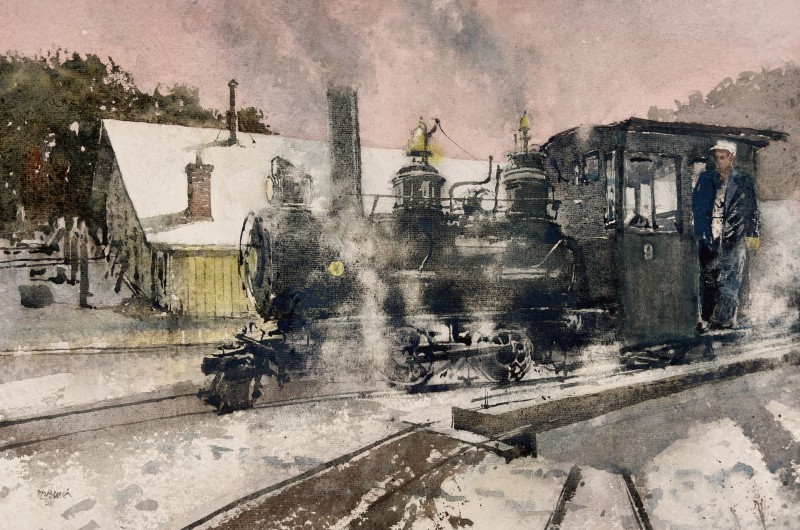My Two & a Half Cents Worth

On Art School Education
General study in a college or university program is a valuable experience that everyone who can manage it should strive for. Study any subject that inspires you, this knowledge can become the point of origin for your future endeavors in art. Your passion for a certain subject will be evident in the work you produce, which comes from observation and understanding of, and a love for that subject. For an education in ART however, I have to recommend studying in a workshop environment with an instructor whose work you admire. So many artists teach, and for a tiny fraction of the cost of university art education, you can get direct instruction from artists whose work you respect most. Helpful workshop formats include both in-person and online instruction, and range from a few days to a full week in duration, or regular weekly classes.
On Workshops
Leave your ego at the door. Be open to letting the instructor in to show you new ways of doing things and new ideas. Don’t expect to do your best during the workshop and don’t try to impress the instructor. Take the lessons and incorporate what helps you into your work, after you leave the workshop.
On Exhibitions
Exhibitions are the backbone of the art business. Exhibit whenever possible. If you can’t get into the top tier shows, try the next level down. If you can’t get into those events, put your work anywhere; including coffee shops, cafés, etc. Getting out there and getting seen is the thing. A word of caution; beginning artists should not leap forward too quickly. Be sure you’re ready to show your work. Exhibiting unskilled or amateur work can inhibit your career before it even gets started. Seek outside advice on your readiness to exhibit, preferably from your instructors.
On Competitions
Put yourself out there and take a chance or you may toil in obscurity. Don’t be fearful of failure in getting accepted. Don’t be disappointed when you’re not selected or awarded, and don’t get too pleased with yourself when you do. Always remember that selections and awards are generally the opinion of one person on one given day. There are many factors that go into judges and jurists consideration, and sometimes the choices have little to do with the quality of the work. As with exhibitions, beginning artists should not try to leap forward too quickly. Be sure to develop a solid skill set before you set out to gain exposure.
On Galleries
Don’t be over-eager to get your work on gallery walls. Be careful and aware that finding the right gallery is a two-way affair. The gallery owners must be enthusiastic about showing and selling your work. Also you must feel positively about showing in the particular area and with the other work in that particular gallery. Be careful in situations where the gallery is giving you a trial run or doing you a “favor“ by showing your work.
On Art Societies and Clubs
There are many societies and organizations that have valuable resources for artists such as; exhibitions, workshops, teaching opportunities, painting competitions, social gatherings, and information sharing. It can be worthwhile to become a member of societies as one of the many ways to connect with buyers and become involved in exhibitions. A few examples include the Salmagundi Club of New York, the American Impressionist Society, Oil Painters of America, American Artists Professional League, and many media specific groups for watercolor, pastel, and oil.
On Art Festivals
Outdoor Art Festivals can be an excellent introduction into many of the skills needed to get you started in an art career. You will come to understand the process of applying to and traveling for events. You will learn how to display and exhibit your work, and most importantly how to talk about and promote your work as you meet directly with potential buyers. It’s also a decent way to earn enough money to potentially support your career without any other source of income.
On Tools and Materials
Don’t worry about what brands or specific colors other artists use. Try as many artist quality brands as you can, and find the ones that work best for you. This includes paint, paper, brushes, palettes and easels. Make and/or modify your own tools whenever possible, to suit your particular methods of work. This includes the many other tools used to apply paint such as rollers, knives, squeegees, sticks, rags, and fingers.
On Travel
Travel is generally enjoyable and can be very eye-opening, but it’s often overrated in its importance by artists. Too much travel can be a little like chasing your tail, and take substantial time away from serious study and work. If you’re always looking for something new and different, you don’t get to know things in depth. Many of the greatest artists in history did most of their work within a short distance of the area they knew well and lived in. Andrew Wyeth is a notable case in point.
On the Art Business
Artists spend a substantial amount of time on business matters: finances, buying supplies, applying to exhibitions and competitions, social media and self promotion, etc. Learning to talk about your work is important to promote and help others understand what you’re trying to accomplish. Business acumen is a different skill set, but also an important part of success as an artist.